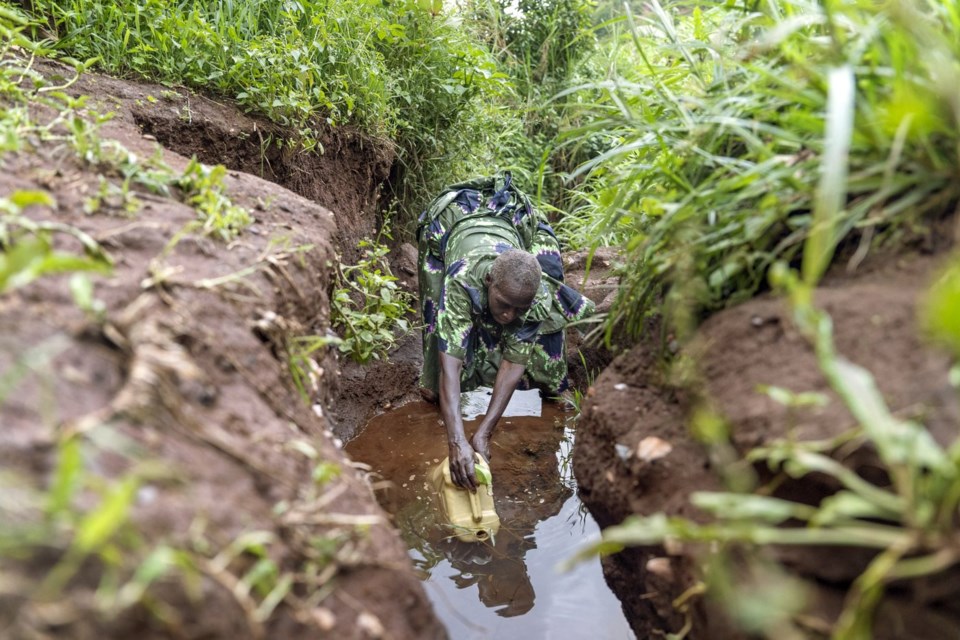MUBUSHURO, Uganda (AP) — Some things have changed as Joy Okwanjire has grown older: Ears that struggle to hear, a back that throbs in pain, and savings that have faded away.
But at least one thing remains the same: A long daily walk to gather water.
Across Africa, where most of the population has no running water, the task of collecting it from a stream, bore hole or spring typically falls to women and children.
It is a responsibility that knows no age: As the continent’s population of older people grows, so too does the number of older people fetching water on arduous daily treks.
“It is a bit difficult,” Okwanjire, who is in her 70s, says. “But I have no option.”
And so, as a thick morning fog blankets the valley below, Okwanjire departs the mud hut she calls home in this hilltop village and sets out on her daily journey.
She wears a long, emerald dress splashed with purple, sandals on her feet and carries a 10-liter plastic jug in her left hand, setting off on a narrow, slippery path bracketed by bean stalks.
The path rises and dips and Okwanjire at times extends her right arm to keep her balance. Birds chirp and a baby goat cries but their sounds are muted by a distant chainsaw.
Along she goes, down a slick, rocky hill, grabbing at the vegetation as she descends. Along she goes, past the fields where women work, through the steep drops, beside the cloudy pool that once was safe enough to drink and used to be her collection spot.
She walks for 27 minutes before arriving at a wispy stream, where she steps down to a rock ledge and nearly slips before dipping the yellow jug in the water and filling it.
Okwanjire shoves a firm, green banana in the mouth of the jug as a stopper, takes one deep breath in, and hoists the jug, placing it lengthwise atop her head. She starts back up the hill.
The hardest part of her journey has begun.
A few minutes up the steep hill, Okwanjire takes the jug from her head and puts it on the ground in front of her, lowering herself to sit in the grass.
“I’m tired,” she says.
Every few minutes it is the same, just as every day is the same. She stops again to rest, then continues the journey that she started as a child.
Many older Africans without running water rely on a relative for help, sparing them a difficult chore. Okwanjire isn’t so lucky.
“Sometimes I wish I could have someone to help me,” she says.
When Okwanjire’s husband was alive, he raised bees, and when the season was good, he could fill a 20-liter jug with honey and sell it for around 400,000 shillings ($109). He bought her dresses and was able to put meat on her plate, but those days are gone.
He died about three years ago, and the bees followed soon after.
“Old age is challenging,” she says. “There are so many things that you need.”
She took up weaving mats to try and make some money, but she only sells six or eight a year and, after materials, each one earns her about 3,000 shillings (80 cents). Sometimes she earns a little extra digging her neighbor’s gardens.
She doesn’t have enough to see a doctor much less install a water tank.
So her walk continues.
On she goes, past a bleating goat that bucks its head into her right leg, past three colorfully garbed women weeding in the field. A few drops of water escape from the jug’s mouth and rocks and twigs crunch beneath her feet. She rests here and there, but mostly she makes an arduous trip look effortless. Her steps are sure. She says she has never fallen.
“When I bend down it hurts,” she concedes, “when I get tired it hurts.”
Okwanjire conserves as best she can, spacing out how often she cleans herself, and reusing water from the utensils she washes. Still, a daily walk is needed.
The clouds part and the sun shines down as a cool breeze blows. Tall grass and ferns tickle at Okwanjire’s legs, and leaves, browned by the sun, brush against her arm.
And then, finally, her home, its façade cracked with age, comes into view.
She has made it. She puts the jug outside her front door, then doubles over, placing her hands on a chair. All told, the trek took 82 minutes.
“I’m really tired,” Okwanjire says. “Very, very tired.”
One day, she knows, she may no longer be able to walk this hill or hoist this jug. She doesn’t know what she will do. That is a problem for another day.
Tomorrow, she says, she will walk again.
___
Matt Sedensky can be reached at [email protected] and https://x.com/sedensky
Matt Sedensky, The Associated Press




